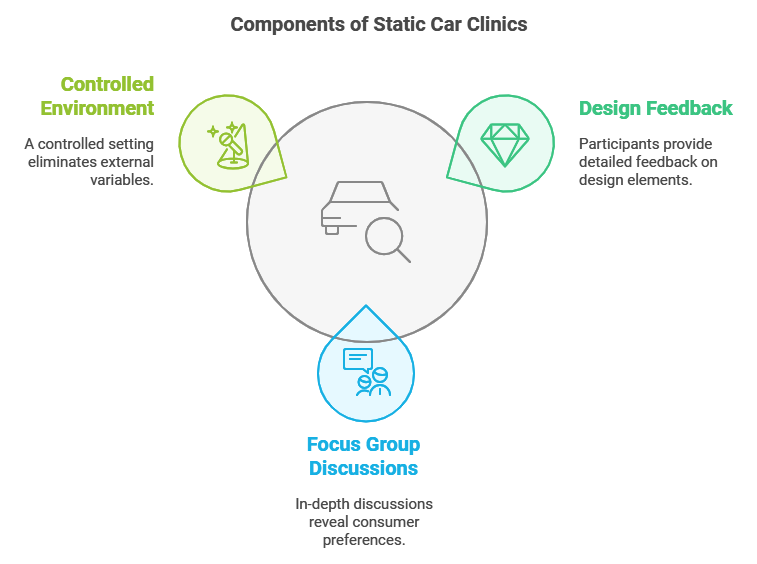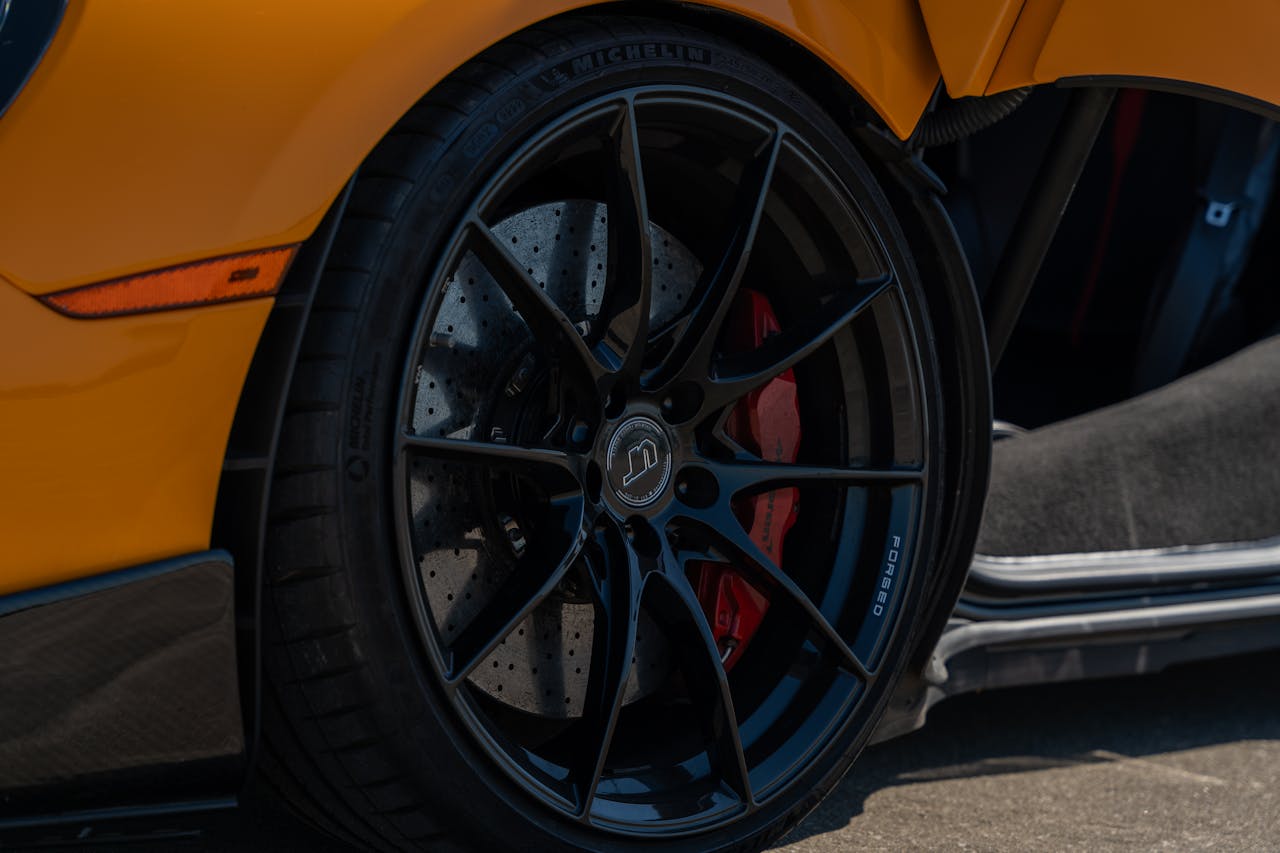Market Research Methods for Automotive Research – Static vs Dynamic Car Clinics

Static vs dynamic car clinics are crucial components of market research in the automotive industry. Static car clinics use focus groups to assess vehicles, while dynamic car clinics involve consumer test drives. Understanding the advantages and differences between these approaches can help manufacturers make informed decisions about car design and development.
How can automotive manufacturers best understand consumer preferences? One key tool in automotive research is car clinics, but how do static and dynamic car clinics differ in providing these insights?
Static Car Clinics: An Overview
Static car clinics are popular for gathering consumer feedback on new vehicle models. In a static clinic, consumers can examine cars up close, inspect their features, and participate in focus group discussions. They are typically conducted in a controlled environment, where participants can provide feedback on different aspects of the vehicle, such as exterior styling, interior features, and overall design.

- Detailed Feedback on Design: Static car clinics allow participants to thoroughly inspect the car’s design elements, providing detailed feedback on exterior aesthetics, interior materials, and overall ergonomics.
- Focus Group Discussions: Focus groups during static clinics enable in-depth discussions among participants, allowing researchers to gain insights into consumer preferences, opinions, and expectations.
- Controlled Environment: Static car clinics are conducted in a controlled setting, eliminating variables such as driving conditions and enabling participants to focus solely on the vehicle’s appearance and features.
The Advantages of Dynamic Car Clinics
Dynamic car clinics further the research by allowing participants to test-drive the vehicles. Unlike static car clinics, where consumers evaluate a stationary car, dynamic clinics provide a more immersive experience, allowing participants to feel the car’s performance, handling, and comfort on the road. This offers several distinct advantages over static clinics.
- Real Driving Experience: The primary advantage of dynamic car clinics is that participants can drive the vehicles. This experience provides valuable feedback on ride quality, acceleration, braking, and handling.
- Holistic Evaluation: Dynamic clinics allow consumers to evaluate the car’s design and driving performance, providing a more comprehensive understanding of the vehicle.
- Consumer Connection: By driving the cars, participants form a deeper connection with the vehicle, resulting in more nuanced and meaningful feedback. Dynamic car clinics are particularly effective for gauging consumer reactions to steering response, noise levels, and overall driving comfort.
Static vs Dynamic Car Clinics: Key Differences

When comparing static vs dynamic car clinics, it’s essential to understand the unique advantages each approach offers.
- Focus of Evaluation: Static car clinics focus on design elements, allowing participants to evaluate the car’s look, feel, and features in a controlled environment. On the other hand, dynamic clinics focus on the driving experience, enabling participants to assess the car’s performance and handling.
- Consumer Interaction: In static car clinics, consumer interaction is primarily visual and tactile, as participants inspect the car without driving. Dynamic clinics offer a hands-on driving experience, often resulting in more detailed feedback on ride comfort, engine responsiveness, and handling.
- Research Outcomes: Static clinics help gather detailed insights into consumer preferences related to aesthetics and features. In contrast, dynamic clinics provide a deeper understanding of the car’s performance on the road.
Combining Static and Dynamic Clinics for Comprehensive Insights
Both static and dynamic car clinics have their strengths, and combining these approaches can offer comprehensive insights into consumer preferences. Automotive manufacturers can fully understand how consumers perceive the vehicle’s design, features, and performance by conducting static and dynamic evaluations.
- Complementary Insights: Static clinics provide in-depth feedback on design elements, while dynamic clinics focus on driving experience. Together, these insights help manufacturers make well-rounded vehicle design and engineering decisions.
- Targeted Improvements: The combination of feedback from both types of clinics allows manufacturers to target specific areas for improvement, ensuring the final product meets consumer expectations in terms of both aesthetics and performance.
The Role of Virtual Reality in Car Clinics
Virtual reality (VR) is increasingly used to supplement traditional car clinics, offering a cost-effective way to gather consumer feedback without the logistical challenges associated with physical vehicles.
- Immersive Evaluation: VR technology allows participants to experience a virtual representation of a car, providing an immersive way to assess design elements without needing a physical prototype.
- Cost Reduction: By using VR, manufacturers can reduce the costs of transporting and setting up physical vehicles, making the research process more efficient.
- Early-Stage Feedback: VR car clinics are particularly valuable during the early stages of vehicle design, allowing manufacturers to gather consumer input before building physical models.
Leveraging Consumer Emotion in Car Clinics

Understanding consumer emotions is a critical aspect of automotive research. Emotional responses to a vehicle can significantly impact purchasing decisions, and car clinics are a prime opportunity to gather insights into these reactions.
- Emotional Connection to Design: Static car clinics allow consumers to connect emotionally with a car’s aesthetics, with elements like exterior styling and interior features significantly shaping consumer sentiment.
- Driving Experience and Emotional Feedback: Dynamic car clinics provide insights into the emotions that consumers experience while driving a car, such as excitement, comfort, or unease. This information is invaluable for manufacturers creating vehicles that evoke positive emotional responses.
- Advanced Measurement Techniques: By incorporating facial recognition and biometric sensors, automotive researchers can quantify emotional responses during car clinics, providing a deeper understanding of consumer preferences.
While car clinics provide valuable insights, conducting static and dynamic clinics presents challenges. These challenges can impact the quality of the data gathered and the ability to make informed decisions.
- High Costs: Car clinics, particularly dynamic ones, can be expensive due to the need for test vehicles, secure locations, and experienced facilitators.
- Logistical Complexity: Organizing dynamic car clinics requires more complex logistics, including arranging safe driving routes, ensuring participant safety, and managing vehicles. Static clinics are generally easier to organize but may not provide the same depth of insight.
- Participant Bias: In focus groups, participants may be influenced by others’ opinions, which could lead to biased feedback.
What Makes SIS International the TOP Market Research Firm for Automotive Research?
SIS International is a leader in providing market insights for the automotive industry, specializing in methods such as static vs dynamic car clinics. Our comprehensive research capabilities, industry expertise, and forward-thinking approach ensure our clients have the knowledge they need to succeed in the competitive automotive market. Here’s how we help:
- Expert Knowledge of Automotive Research Methods:
SIS International Research has extensive automotive research expertise, including static and dynamic car clinics. We offer accurate, data-driven insights into these clinics, making us uniquely qualified to guide our clients through product development and market introduction. - Customized Research Solutions:
We tailor our research solutions to meet our clients’ needs. Whether we understand consumer preferences for car design, analyze driving experience feedback, or evaluate focus group discussions, our customized research helps clients stay ahead of the competition. - Comprehensive Analysis:
At SIS, we provide a holistic market analysis by leveraging our extensive industry network and connections. Our research covers key drivers of consumer sentiment, including vehicle aesthetics, driving performance, and overall comfort. - Partnership with Industry Leaders:
We collaborate closely with leading automotive manufacturers and stakeholders. These partnerships allow us to provide our clients firsthand insights into the latest market developments, ensuring they receive the most up-to-date and relevant information. - Data-Driven Insights for Informed Decision-Making:
We utilize cutting-edge data analytics tools to provide our clients with actionable insights, allowing them to make informed decisions about product development, marketing, and strategic investments. - Commitment to Quality and Innovation:
Our commitment to quality and innovation sets us apart. We focus on helping clients develop products and strategies that resonate with consumers, address their primary concerns, and build trust in their automotive offerings. - Trend Forecasting and Strategic Planning:
Our expertise in trend forecasting helps clients anticipate changes in consumer preferences, ensuring they are well-prepared for the future. We assist our clients in strategic planning, allowing them to confidently navigate the opportunities and challenges of static and dynamic car clinics. - Proven Track Record:
SIS International Research has a track record of success, having helped shape the strategies of leading players in the automotive industry. Our research has driven successful product launches and informed strategic decisions, making us the go-to partner for market insights on static and dynamic car clinics.
SIS International Research is proud to be at the forefront of automotive market research, providing the expertise, insights, and guidance needed to thrive in the evolving automotive landscape.
About SIS International
SIS International offers Quantitative, Qualitative, and Strategy Research. We provide data, tools, strategies, reports, and insights for decision-making. We also conduct interviews, surveys, focus groups, and other Market Research methods and approaches. Contact us for your next Market Research project.


